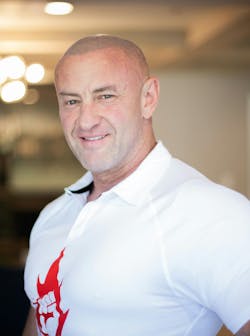Shop on Fire and the Holistic Approach to Business Coaching
Spend a little time poking around the Shop on Fire website (shoponfire.com) and you’ll find a lot of things that look like the expected approach to business coaching: Lead Generation, Technician Sales Training, Succession Planning, Call Booking Training. But then dig a little deeper and you’ll find topics like: Health & Energy Coaching, Parenting Coaching, Divorce Coaching. That diversity of offerings is driven by an underlying principle guiding everything the company does: that success in business is just one facet of a successful life.
That holistic approach has been at the core of founder Jeremiah Webb’s business philosophy since he founded Shop on Fire back in 2011. “I want to make sure that what I teach you doesn't just book a call,” Webb says, “But that it helps you, say, overcome a problem with your cousin that you haven't talked to for three years… we want everything we teach to be something you can use in literally any area of your life.”
Multiple Perspectives
Webb has a varied background that has taken him through several different industry channels. He worked for his family’s HVAC company before it was sold off to private equity. His career then took him to OEMs Ingersoll Rand (Trane, American Standard), Michael and Son Services (the nation’s largest HVAC dealer), and Johnstone Supply Group.
Webb has held leadership roles in finance and client management, working with Fidelity Investments, Morgan Stanley, Merrill Lynch, and American Express. As if that weren’t enough, he’s found time to pursue interests as a high-performance athlete and learn multiple languages.
A Deeper Level
Shop on Fire training is tailored to the specific needs of the client. Pinpointing those needs and their underlying causes is the critical first stage of Webb's coaching.
“One of the things that we do in all of our training is we don't solve the problem, we solve why the problem is a problem, and that takes a deeper level of work,” says Webb.
The common saying in business is “leave your emotions at the door”— that there’s no place for feelings in the workplace. Webb, to the contrary, finds the idea of abandoning our emotions for the sake of our work to be counter-productive, and that trying to force (or enforce) that division only creates the kind of two-faced, inauthentic people no one wants to work or do business with. Bringing genuine emotion to the workplace can instead be a source of strength and inspiration. The key is to not let negative emotions interfere with your objectives.
That means facing your fears. And Webb has discovered over the years that the two most common fears are the same for nearly everyone (no matter what level of success they’re operating at): "I will never be loved," and "I’m not enough."
The Art of Fulfillment
Consequently, Shop on Fire stresses the importance of fulfillment over achievement, and sees strong, rich, healthy interpersonal relationships as the foundation of genuine fulfillment. Success, Webb says, is scientific, but fulfillment is an art.
“How many go-getters get blindsided in their relationships?” Webb asks. “All of a sudden, the wife leaves, or all of a sudden the kid goes totally against everything you've taught? Where does that come from? How do we avoid the pitfalls and the blind spots?”
For a lot of high-level professionals, the reason is because they’ve invested so much of themselves in their professional life, at the expense of their personal life. And, oddly, professional success can then become a barrier to healthy relationships. “If I'm in my business crushing it, they're treating me like a god, and then I go home and my wife is like, ‘Hey, you didn't take out the garbage’ well, where am I going to spend my time?” Webb says.
Webb says that genuine happiness and fulfillment can come from success in business—and the money that accompanies that success can be gratifying—but it pales beside the value of relationships. In the course of his work, Webb has met his share of rich, bored and miserable people.
“Ultimately I think the money just amplifies who you are,” Webb says. “If you're a jerk, you're a huge jerk with a lot of money. If you're an awesome guy, you're an awesome guy with a lot of money. So I really think people don't change.”
Recovery
Another key aspect of Webb’s coaching involves how we cope with failure. Failures, large and small, are inevitable in business and in life. In fact, if you’re not failing at something, it probably means you’re not pushing your personal boundaries hard enough. But it is important to learn from failure, grow from failure, and not allow our failures to define us.
“What's the biggest distinction between a great athlete and an elite athlete?” Webb asks. “You say, well, DNA, work ethic, will, heart, desire… I say, yes, all those are important. But I think the single biggest distinction is the ability to bounce back faster from negativity and mistakes.
“Defeat doesn't come from what others say about you. It comes from what you say about you. And really it comes down to what does my team—at home, at work, at play—what do they say about themselves?”
About the Author
Steve Spaulding
Editor-in-Chief - CONTRACTOR
Steve Spaulding is Editor-in-Chief for CONTRACTOR Magazine. He has been with the magazine since 1996, and has contributed to Radiant Living, NATE Magazine, and other Endeavor Media properties.

